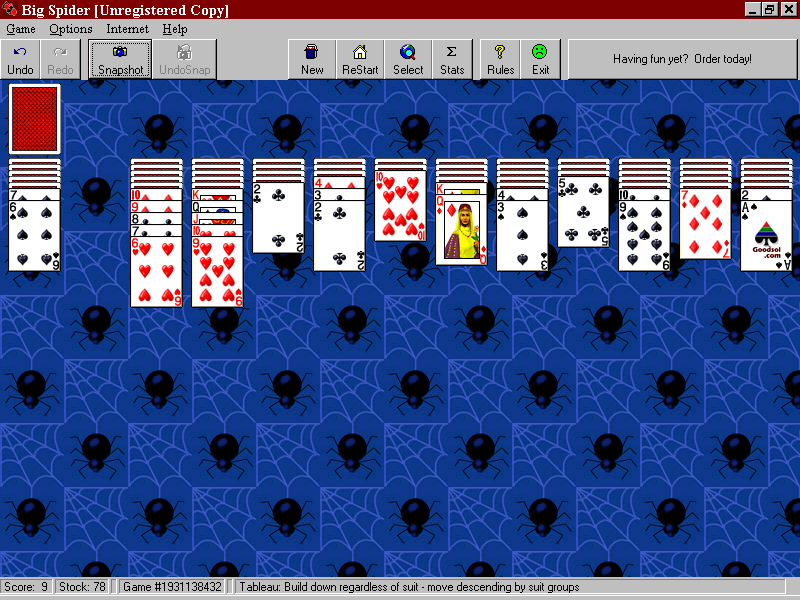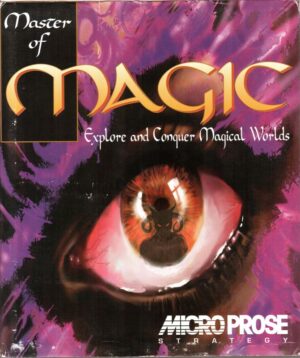Retro Replay Review
Gameplay
Pretty Good Solitaire 600 delivers its promise of a massive card-playing buffet with over 600 distinct solo variations. From classic favorites like Klondike, FreeCell, Spider, and Fan to creatively tweaked variants that employ up to four decks at once, there’s an option for every patience level and strategic appetite. If you prefer quick pairing games, you’ll find plenty of simple addition-based challenges; if you crave complexity, you can tackle layouts with multiple foundation- and tableau-building rules.
(HEY YOU!! We hope you enjoy! We try not to run ads. So basically, this is a very expensive hobby running this site. Please consider joining us for updates, forums, and more. Network w/ us to make some cash or friends while retro gaming, and you can win some free retro games for posting. Okay, carry on 👍)
Navigation through the extensive collection is streamlined by built-in sorting filters—organize games by type, difficulty, or the ratio of skill to luck. Feeling adventurous? Ask the software to pick a random challenge within your chosen category. For a more structured session, the “Tour” mode sequences similar games back-to-back, while the “Quest” mode tasks you with nine progressively tougher puzzles, letting you choose some of the stops along the way.
Every game state is auto-saved as you play, so you can pause a marathon session and pick up right where you left off. Detailed statistics track wins, losses, moves, times, and more, feeding the urge of completionists to polish their records. If the 600 built-in titles still don’t satisfy, the intuitive Wizard interface lets you craft custom games by mixing and matching features—change deck size, adjust build rules, shuffle variations, and save your creations for future play.
Graphics
Visually, Pretty Good Solitaire 600 favors function over flash, presenting clean card faces and a neatly laid-out tableau that prioritize clarity above all. The default card designs are easy on the eyes and readable even in long sessions; color-blind players will appreciate the sharp suit symbols. A modest selection of backgrounds lets you swap in soothing hues or subtle patterns, though purists can stick to the classic green or blue felt options.
Transitions and animations are minimal but purposeful—cards slide or fade into place without distracting frills, keeping your focus on strategy rather than spectacle. The interface scales well on modern monitors, and high-resolution support ensures text and icons remain crisp. While you won’t find cinematic cut-scenes or elaborate 3D effects, the interface remains responsive and streamlined, even when you attempt a four-deck Spider variation.
Customization extends beyond card backs and backgrounds. You can adjust animation speed, choose to highlight legal moves, display remaining card counts, or mute sound effects if you prefer silent concentration. Altogether, the visual package is understated but serviceable, delivering exactly what a solitaire aficionado needs: a clear view of the cards and enough polish to make each hand feel satisfying.
Story
As a solitaire collection, Pretty Good Solitaire 600 doesn’t present a traditional narrative or characters, but it does weave its own “story” through progression and mastery. Each variant offers a self-contained puzzle with its own ruleset, and conquering increasingly complex games can feel like leveling up in a more conventional title. The Quest mode amplifies this sense of journey by grouping cards into tiers of difficulty and letting you chart your own course through nine escalating challenges.
The absence of a linear plot allows you to craft your personal arc of improvement—perhaps you begin as a Klondike novice, graduate to multi-deck Spider, and eventually design your own custom layout with the built-in Wizard. Statistics dashboards act like journal entries, chronicling how many times you’ve beaten Baker’s Dozen or how often you’ve cleared Pyramid. Over time, those numbers tell a story of dedication and skill refinement.
For players who prefer narrative, the game’s only “characters” are the deck designs and background themes you choose. Yet, even this minimalist approach can inspire a light-hearted fiction: a rainy afternoon spent unraveling card mysteries, or the satisfaction of outwitting a fiendishly stacked tableau. In that sense, the story emerges from your mind rather than from pre-written text, and every completed game is a mini-tale of strategic victory.
Overall Experience
Pretty Good Solitaire 600 stands out as one of the most comprehensive solitaire compilations available. Its sheer volume of games ensures you’ll never run out of challenges, while the built-in filters, Tour, and Quest modes add structure and variety to what could otherwise be repetitive play. The custom-game Wizard elevates the package, letting you experiment with house rules and design bespoke card puzzles.
While graphics and sound take a backseat to functionality, the interface is clear, responsive, and unobtrusive—exactly what serious solitaire players need to focus on their next move. The auto-save and statistics features further enhance the experience, turning each session into a chance to hone your technique and track your improvements over time. Whether you play daily for a quick break or dive into marathon puzzle sessions, the software accommodates both styles effortlessly.
Offered as shareware with a 30-day unrestricted trial, Pretty Good Solitaire 600 lets you test drive every feature before committing to a purchase. For anyone seeking a nearly endless, customizable solo card experience, it’s hard to beat the value on offer. Casual players, completionists, and solitaire veterans alike will find reasons to keep shuffling, building, and strategizing for hours on end.
 Retro Replay Retro Replay gaming reviews, news, emulation, geek stuff and more!
Retro Replay Retro Replay gaming reviews, news, emulation, geek stuff and more!









Reviews
There are no reviews yet.